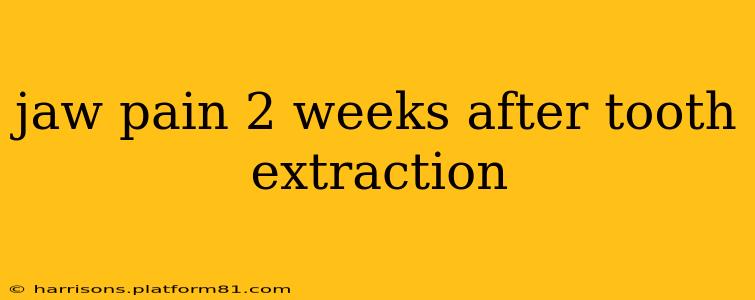Jaw Pain 2 Weeks After Tooth Extraction: Understanding the Causes and Seeking Relief
Experiencing jaw pain two weeks after a tooth extraction is concerning, but not necessarily unusual. While some discomfort is expected after any oral surgery, persistent or worsening pain warrants attention. This comprehensive guide explores potential causes, effective management strategies, and when you should seek professional medical help.
Why Does My Jaw Still Hurt Two Weeks After Tooth Extraction?
This is a common question following extractions. Several factors can contribute to lingering jaw pain:
-
Dry Socket: This is a painful complication where the blood clot protecting the extraction site dislodges or dissolves prematurely. It exposes the underlying bone and nerve endings, leading to intense, throbbing pain that often radiates to the jaw. Dry socket typically develops within a few days of the extraction, but it can occasionally present later. Symptoms include a persistent, sharp pain, a visible empty socket, and a bad odor or taste.
-
Infection: Infection at the extraction site is another possible culprit. Symptoms can include swelling, redness, increased pain, fever, and pus. Delaying appropriate treatment can lead to more serious complications.
-
Referred Pain: Pain originating in one area of the body can sometimes be felt in another. Jaw pain after a tooth extraction may be referred pain, meaning the actual source of discomfort might be the extraction site itself, even if the pain is felt more intensely in the jaw.
-
Sinus Issues: Extractions in the upper jaw can sometimes lead to sinus complications, especially if the extraction site is close to the sinus cavity. This can cause pain in the jaw area.
-
Temporomandibular Joint (TMJ) Dysfunction: The TMJ connects your jaw to your skull. Stress, injury, or even the surgery itself could exacerbate pre-existing TMJ issues or create new ones, leading to jaw pain.
-
Osteitis: This is an inflammation of the bone, a less common but potentially serious complication of tooth extraction.
-
Nerve Damage: While rare, nerve damage during the extraction is a possibility that can cause persistent pain.
What Can I Do to Relieve the Pain?
While you should always consult your dentist or oral surgeon, here are some things you can try to alleviate the discomfort:
-
Over-the-Counter Pain Relief: Ibuprofen or acetaminophen can help manage pain and inflammation. Follow the dosage instructions carefully.
-
Warm or Cold Compresses: Applying warm compresses can help soothe inflammation and promote healing. Cold compresses can help numb the area and reduce swelling, especially in the early stages. Alternate between warm and cold for maximum benefit.
-
Saltwater Rinses: Gentle saltwater rinses can help keep the extraction site clean and reduce the risk of infection. Mix a half-teaspoon of salt in a glass of warm water and rinse gently several times a day.
-
Rest: Avoid strenuous activities and get plenty of rest to allow your body to heal.
-
Soft Foods: Stick to soft, easily chewable foods to avoid putting pressure on the extraction site.
When Should I See a Dentist or Oral Surgeon?
If your jaw pain is severe, worsening, or accompanied by other symptoms like fever, swelling, redness, pus, or a bad odor, you must seek immediate professional medical attention. Don't hesitate to contact your dentist or oral surgeon if:
- The pain is significantly worse than expected.
- The pain isn't improving after a week of home care.
- You have signs of infection.
- You have difficulty opening or closing your mouth.
- You have numbness or tingling in your jaw or face.
Ignoring these symptoms could lead to serious complications.
How Long Does Jaw Pain After Tooth Extraction Typically Last?
The duration of post-extraction jaw pain varies significantly depending on the individual, the complexity of the extraction, and the presence of any complications. Most people experience only mild discomfort for a few days. However, lingering pain for two weeks or more is often a sign that something requires attention.
Can a Tooth Extraction Cause Long-Term Jaw Pain?
While most cases of post-extraction jaw pain resolve within a reasonable time, the potential for long-term issues exists, particularly if complications like infection or nerve damage occur. Prompt and appropriate treatment is essential to minimize the risk of chronic problems.
This information is intended for educational purposes only and does not constitute medical advice. Always consult with a qualified dental professional for any concerns regarding your oral health.
